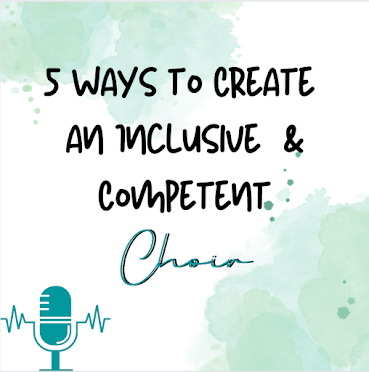How do I create an Inclusive & Competent Choir?
Creating a space where people feel invited and safe invites participation, laughter, & acceptance! In order for kids to share their voices, they need to know their voice matters. Inclusion is key.
But we also want our ensembles to teach valuable music skills, right?! So, how do you do that?
1. Warm Up for the Win
Ever looked at your precious time to yourself & thought, "I can go for a run, but I don't have enough time to really warm up..." and then decide to skip those stretches but end up paying for it the next day?
I'm not a runner, so the idea of chasing the wind seems like torture enough, but not warming up makes the pain linger much longer.
The same applies to music. Tuning instruments takes time and, especially in the early days, seems to steal much needed rehearsal opportunities. Do it any ways.
Having warm ups that students know allows them to self-start & build listening skills as well as vocal techniques.From "Mama Made Me Mash My M&M's" to "1-1-2-1" warm ups, there are so many benefits to warming up:
- Rhythmic unity
- Practice diction
- Tonality practice
- Harmony
- Unison
- Ear Training
- Welcoming Activity
- Predictability is comforting
2. Learn to love the legacy
It doesn't matter if it is Freshman looking up to seniors, 5th graders admiring 8th graders, or elementary kids in awe of middle schoolers. Building a legacy is vital!
Having section leaders is a fantastic opportunity for students of any age. Seriously. While high school section leaders may be more capable of teaching musicians that need additional help, strong middle school singers are also very capable!
- Seat strong singers in the center to allow others a musical lighthouse.
- Speak to section leaders about creating an inclusive space & being welcoming.
- Use section leaders to take attendance, review parts, or be buddies.
3. Spend time together
I've had choirs that met daily as a class which meant loads of rehearsal time! I've also had 30 minutes per week to try to assemble a few songs for a concert. And ya know what? It was much easier to prioritize time together when kids had more time in rehearsal. Like, SO MUCH EASIER.
Do it anyways. Have a back to school reunion. An end of the year party. Celebrate birthdays. Allot 5 minutes at the end of rehearsal to check in with kids and let them check in with others. I promise you: mentally well choirs sing better.
Consider end of the year awards. They can be simple, informal, or a big celebration. Just remember that everyone likes to be seen as they are & for who they are.
4. Really Rehearse
Let's break this down:
- Plan your rehearsal. Set goals & objectives that can be measured. What songs do you want to cover & how do you want to learn them? What measures are tricky & what skills do the musicians need to practice in order to be successful?
- Give students tools to make decisions. For the changing male voice, they need to learn how to switch between octaves appropriately. If someone can't make it through a phrase, they need to know how to stagger breathe.
- Consider both strong singers & non-musical members when challenging students.
- Librarian to store, mend/copy music
- Section leaders to help struggling singers
- Social leaders to coordinate fun activities
- Solos or contests for students wanting a challenge
- Perform. This sounds like a no-duh statement, right? Of course we need to perform as a performance ensemble! But I'm not talking just about concerts. I'm talking about getting out into the community to perform in town, at senior citizen homes, for local celebrations like parades, tree lighting, ground breaking, or homecoming.
5. Un-auditioned or Self-Selected?
I've heard of audition-based choirs. Elite ensembles. Chorales & chambers. But what do you call your inclusive chorus? What do you call the choir where everyone was welcome?
Let's start by stopping. Instead of comparing your audition-based choir to your un-auditioned choir, acknowledge that you have an ensemble where students audition into it and another where the students select their participation. Hold them to the same standards of expectation; full commitment, effective focus, & dedication to the craft.
As my college band director used to sign his emails:
"Now go practice!"
Jaime



Comments
Post a Comment
If you have a Google account (such as Youtube, Gmail, Google Apps, Google+, Blogger), feel free to leave a comment or words of encouragement here! If you don't have a way to sign in, you can still leave a message on the main page under the 'Leave Jaime a Message' title on the right side of the page, below the calendar!